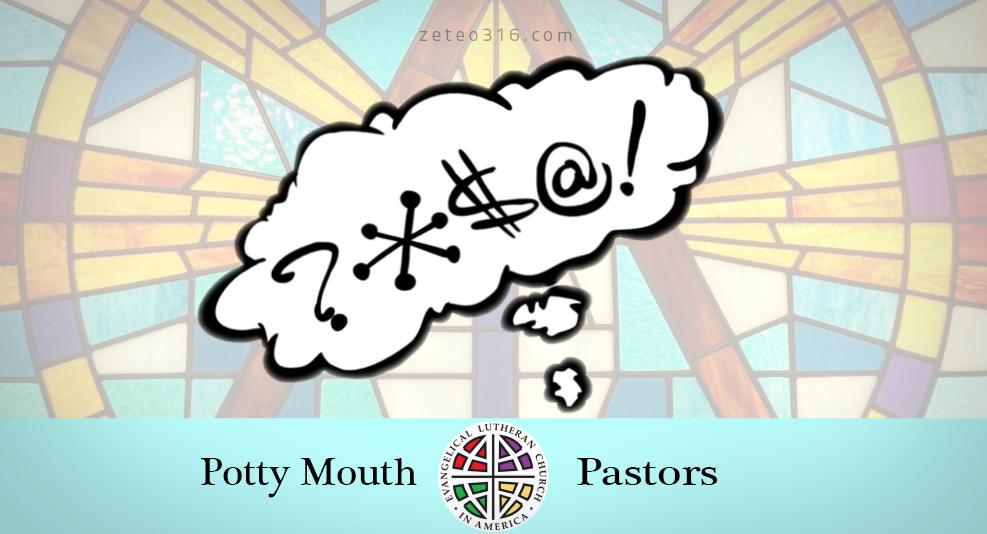The case of the Potty Mouth ELCA Pastors…
I’d never heard of the Evangelical Lutheran Church of America (ELCA) until I came across Barbara Rossing’s book “The Rapture Exposed.” The title speaks for itself. I’d already read similar polemics against “Left Behind” dispensationalism. Reviewers of Professor Rossing’s book claimed she was a scholar who set “End Times fiction” straight. In fact I thought her book was the worst example I’d read of its type and perhaps the subject of a future review. You can read a response from Kevin Zuber HERE.
Why was the book so anti-dispensational? Well, Rossing is an ELCA minister. The ELCA has a reputation for being a “progressive-liberal” church. To gain some understanding of how the organization ticks you can begin with the article Diversity in the Bible as a Model for Lutheran Hermeneutics. If the link doesn’t work, try this. The ELCA evaluates Scripture through diversity lenses.
These “diversity issues” encompass LGBTQI+, the environment and a range of others social justice concerns. The ELCA church is geared to gender issues and champions women’s rights (abortion, feminism etc). Note this article. It also tends to embrace a sort of Shock-Progressive Theology. One ELCA seminary professor teaches that a pagan goddess is the Holy Spirit.
The Rev Wil Gafney wrote:
“When you killed the four hundred fifty prophets of Baal but not the four hundred prophets of Asherah was it because you really didn’t mind a little goddess worship on the side? Are we feminists right in saying that Asherah was just the Canaanite articulation of the Holy Spirit and not really another God?”
Language cautions in links ahead.
With this background it shouldn’t be any surprise that some ELCA pastors have adopted profanity in their everyday language. The phenomenon of the potty-mouth pastors may have received its inspiration from Pastrix author, Nadia Bolz-Weber, who has made profanity her signature. She has stated that she will keep swearing because she refuses to pretend to be someone who she isn’t.
Now there are ELCA devotionals which regularly incorporate a vulgar term for intercourse. Some argue that a “visceral gospel requires visceral language.” Rev. Tuhina Verma Rasche created a Facebook post asking people for their favorite swear words and got 100 responses. She said:
“We are using these words because they are troubling. They are unsettling. They are being used to move us from places of complacency. If anything, we are using these words to reflect the brokenness of the humanity in which we live.”
When former ELCA Pastor Tom Brock commented on the swearing, his Facebook page was visited by a handful of ELCA apologists, including Verma Rasche. I briefly participated in that interesting discussion. Notably, a few of the people brought this language with them, though neither the gospel or devotions were being discussed.
What stood out were the different strategies used to defend potty-mouth language. It was claimed that the prophets, Jesus and Paul all used stark “offensive” language. The Bible uses stark language in some instances where context demands. But there is no biblical example of a vulgar expression for intercourse ever being used as an interjection or an adjective.
One ELCA fellow suggested that if the prophets etc had an equivalent “F” word they would have used it. Can we really believe they didn’t have an equivalent word? Another said that there isn’t any evidence that they didn’t use it. Of course this begs the question.
Still another person used the excuse that fundamentalists aren’t worried about “Old Testament genocide” yet will fret over some swearing. Genocide is a handy tool that people run to when the Bible appears to contradict a particular diversity cause. The Bible is only resorted to if it can be used – otherwise it is discarded. See the following blog about Rachel Held-Evans.
Many in the ELCA and a growing number of Christians have incorporated and emphasized Social Justice into the gospel message. They often deny sin and hell and embrace universalism. When one refuses to enthrone Scripture or re-interprets it based on diversity issues, then one can defend just about anything.
Do we really need visceral language to preach the gospel as these pastors say? No. The gospel is simply summed up in John 3:16-18; Rom 6:23 and 1 Cor 15:3-4. It doesn’t need an “F” or “S” word to get the message across.
Col 3:1-17 speaks directly to the issue. Christians have a new identity in Christ, as well as a responsibility to Him. It ultimately boils down to whether we believe Scripture and who we serve. It’s really that simple.
Further reading:

